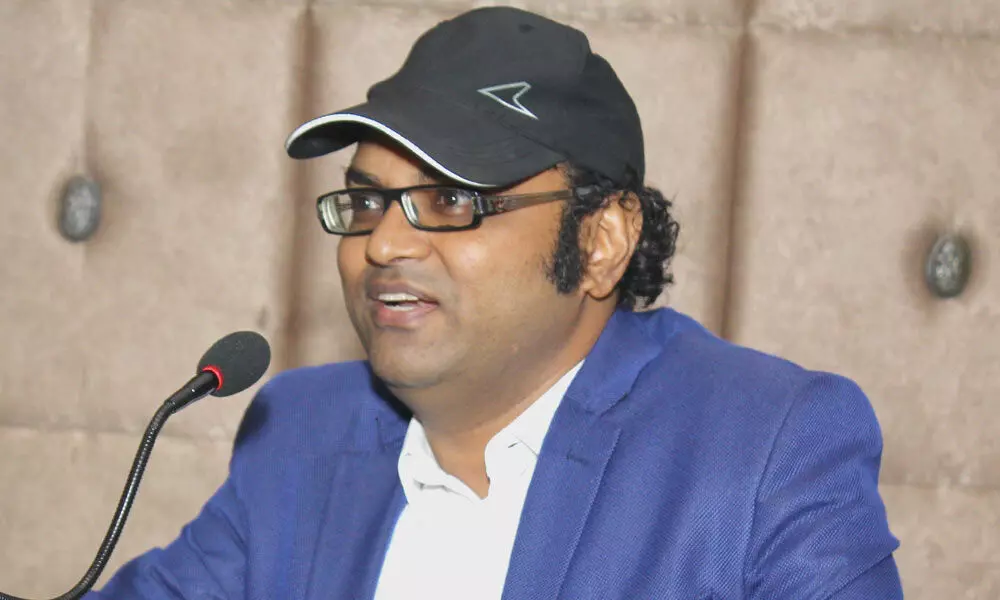Live
- I want to have that chance of playing in IPL, says Swastik Chikara ahead of mega auction
- Damson Technologies Inaugurates State-of-the-Art Manufacturing Facility in Ahmedabad with Rs. 200 Crore planned Investment
- Waqf row: BJP stages protest condemning land grab in Karnataka
- President Droupadi Murmu Graces Koti Deepotsavam in Hyderabad
- South Korean court sentences ex-fiance of Olympic fencing medalist to 13-yr prison term
- Posani Krishna Murali Announces Exit from Politics
- Allu Arjun and Sreeleela to Ignite the Stage with Pushpa-2’s Special Song
- World Television Day 2024: From B&W Beginnings to Smart TVs and Their Role in Shaping Elections
- Bihar: Kaimur residents buy cheap medicines from Jan Aushadhi Kendras, thanks govt
- JMM confident of winning 59 seats in Jharkhand
Just In
Technology-Oriented Curriculum is the New Pedagogy


Rajeev Tiwari, Co-founder, STEMROBO Technologies
We must incorporate Technology-Oriented Curriculum Delivery, which is based on technique and pedagogy aligned with the demands of 21st Century Skills, into our education delivery for K-12 students and schools, says Rajeev Tiwari, Co-founder, STEMROBO Technologies.
Rajeev Tiwari, Co-founder, STEMROBO Technologies, shares his views with The Hans India. STEMROBO Technologies Private Limited is an Educational Technology Company focused on leveraging Technology in Education, which will act as an Enabler for Students to Learn and Innovate in the field of STEAM, Robotics, IoT & Artificial Intelligence( AI).
In the year 2021, the education sector was allotted Rs 93,224 crore, with Rs 54,873 crore going to school education and literacy and Rs 38,350 crore going to higher education. With a population of 600 million, India's youth account for more than half of the country's population, and the sheer volume of announcements in the education sector underscored the sector's importance in defining the country's future. This year it seems more likely for allocation to cross the 100,000 crore mark as the pandemic has further accelerated the need for a greater allocation for Building Innovation Ecosystem in Indian Educational Institutes and Enhancing Teachers Capacity, and to provide greater accessibility to students in far-flung areas.
A cut in the tax rate would be most welcomed from the government side and it would be a great relief for the parents paying the tuition fees. This conundrum, which has arisen as a result of the pandemic in children's learning stages, can be resolved by continuing to use educational technologies and implementing new approaches to satisfy the demands of parents and students. Our expectation is that the Union Budget should further drive policies around Innovation, Creativity, and Experiential Learning. NITI Aayog's flagship Project Atal Tinkering Labs which was set up in 2016 has been making a great impact in this regard, the need is to further strengthen this project and link its learning outcomes in STEM, Experiential Learning, AI, and Coding.
Since the pandemic's peak, almost 200 million children have missed a full year of formal schooling as a result of the lockdown. This scenario is exacerbated in India's smaller towns and cities, where even low-cost private institutions have struggled to deliver the necessary online education. This is due to a lack of technological infrastructure in schools and teachers who are underprepared so the emphasis should be on programmes to improve Internet connectivity infrastructure across the country, ensuring last-mile connectivity, inexpensive 5G devices, and, most crucially, assisting e-learning players with a solid e-learning infrastructure.
A reduction in the tax rate for ed-tech businesses might give even more momentum and encourage further investment, as the current GST rate of 18% is posing a barrier to these new businesses reaching their full potential. Lowering it to around 5% will do the good.
At the K-12 level, the emphasis in education delivery for the government sector has typically been on quantity, improving education scope, and spreading. However, there appears to be an increasing need for Indian students to organize themselves and take their global companionship seriously. To do this, we must incorporate Technology-Oriented Curriculum Delivery, which is based on technique and pedagogy aligned with the demands of 21st Century Skills, into our education delivery for K-12 students and schools. In order to address these concerns, Budget 2022 should allow for improved accentuation and discretionary designation.
The unveiling of the NEP 2020 framework has taken place but the implementation of National education policy 2020 and schemes should be on the lines of Ayushman Bharat. but more concrete measures and an incentive system is the need of the hour.

© 2024 Hyderabad Media House Limited/The Hans India. All rights reserved. Powered by hocalwire.com






